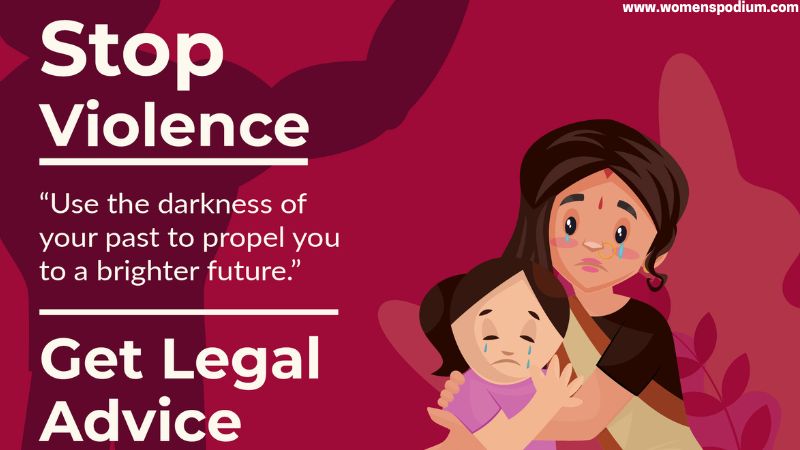
Abusive relationships are a deeply concerning and prevalent issue that affects individuals across all walks of life. It is vital to understand the reasons why people stay in these toxic and harmful environments, despite the apparent risks involved. By shedding light on the complex dynamics at play, we can hope to increase awareness, compassion, and support for those trapped in abusive relationships. Many wonder why people stay in abusive relationships, but understanding their perspective reveals the real reason. Some people may stay in abusive relationships due to fear, financial dependency, low self-esteem, hope for change, or manipulation tactics used by the abuser. In this article, we will discuss in-depth.
Dynamics of Abusive Relationships

Abusive relationships are characterized by a power imbalance where one partner exerts control and dominance over the other through various forms of abuse. While abuse can manifest in different ways, including emotional, physical, or financial, the underlying dynamics remain remarkably similar.
In emotionally abusive relationships, the victim experiences constant belittling, manipulation, and humiliation, which gradually erode their self-esteem and self-worth. On the other hand, physical abuse involves the use of force, resulting in visible scars, bruises, and injuries. Financial abuse, often overlooked, entails the control of finances and resources, leaving the victim economically dependent and vulnerable.
The dynamics of abusive relationships often involve a cycle of tension building, explosion, and reconciliation, perpetuating a continuous loop of abuse. The abuser may subject the victim to periods of extreme tension and fear, which eventually culminate in an explosive outburst. Afterward, the abuser may exhibit remorse, apologize, and promise to change, leading the victim to believe in the possibility of a better future.
Also Read: If you figure out how to resolve and deal with those disappointments, you are halfway there on the 5 stepping stones in a relationship.
Psychological Factors Influencing Stay – Why Do People Stay in Abusive Relationships?

When examining why individuals stay in abusive relationships, it is crucial to consider the psychological factors that contribute to their decision to remain despite the harm inflicted upon them. By understanding these factors, we can gain insight into the complex dynamics that keep individuals trapped in abusive situations.
1. Low Self-esteem and Lack of Self-worth

One significant psychological factor that keeps individuals in abusive relationships is a deep-rooted sense of low self-esteem and lack of self-worth. Abusers often employ tactics to demean and belittle their victims, eroding their self-confidence and distorting their perception of themselves.
Studies have shown that individuals with low self-esteem are more likely to remain in abusive relationships, believing that they deserve the mistreatment or that they are unable to find a better alternative.
2. Fear of Escalation and Retaliation

Fear plays a significant role in perpetuating the cycle of abuse. Victims often fear the escalation of violence or retaliation from their abusers if they attempt to leave the relationship. This fear creates a sense of helplessness and makes it challenging for individuals to take steps toward ending the abusive situation. Domestic violence-related homicides often occur when victims are in the process of leaving or have recently exited an abusive relationship. The act of escape carries the inherent risk of life-threatening danger for these individuals.
3. Manipulation and Gaslighting

Abusers frequently employ manipulation and gaslighting as tools to control their victims and distort their sense of reality. Gaslighting involves the abuser deliberately causing the victim to doubt their own perceptions, memories, and sanity.
This manipulation tactic leads victims to question their own experiences, often believing that the abuse isn’t as severe as it seems or that they are somehow responsible for the mistreatment.
4. Isolation and Dependence on the Abuser

Abusers often isolate their victims from friends, family, and support networks as a means of control. By cutting off these external connections, victims become increasingly dependent on their abusers for emotional support, financial resources, and a sense of security.
Isolation serves to further entrap individuals within the abusive relationship, as they may feel they have nowhere else to turn. This sense of dependence and lack of social support can make leaving the relationship seem like an insurmountable challenge.
The Trauma Bond

In the context of abusive relationships, a trauma bond refers to a strong emotional attachment that develops between the victim and the abuser as a result of the cycle of abuse and intermittent reinforcement. Understanding the dynamics of trauma bonds is crucial in comprehending why individuals stay in abusive relationships.
Trauma bonds are intense emotional connections that form in abusive relationships. These bonds are characterized by a complex interplay of fear, love, dependency, and hope. They develop as a result of the manipulation and psychological control exerted by the abuser, leading the victim to feel emotionally entangled with their perpetrator.
Trauma bonds often stem from a combination of factors such as intermittent reinforcement, shared intense experiences, and the victim’s psychological and emotional vulnerabilities. They create a distorted sense of attachment, making it challenging for the victim to break free from the abusive relationship.
The Cycle of Abuse and Apology

Abusive relationships typically follow a cyclical pattern that includes periods of tension building, explosive abuse, and subsequent apologies or acts of remorse. This cycle contributes to the formation and strengthening of trauma bonds.
During the tension-building phase, the victim may feel a constant sense of walking on eggshells, anticipating the outburst of abuse. This creates anxiety and fear within the relationship. Eventually, the tension erupts into an explosive episode of abuse, leaving the victim feeling powerless and traumatized.
Following the abusive episode, the abuser may apologize, show remorse, and make promises to change their behavior. These apologies and displays of affection create a glimmer of hope for the victim, leading them to believe that the relationship can improve. This intermittent reinforcement of kindness amidst the abuse further reinforces the trauma bond.
The Power of Intermittent Reinforcement

Intermittent reinforcement plays a significant role in trauma bonding. The abuser alternates between abusive behavior and intermittent acts of kindness, which creates an emotional rollercoaster for the victim. The victim becomes hooked on the occasional moments of love, support, and affection, creating a powerful attachment.
This pattern of intermittent reinforcement triggers the release of dopamine in the brain, creating a strong emotional bond akin to addiction. The victim becomes psychologically reliant on the intermittent positive reinforcement, hoping for more of these moments and believing that they can change the abuser.
It is important to note that trauma bonds can be highly complex and deeply ingrained, making it difficult for victims to recognize the unhealthy nature of their attachment to the abuser. Breaking free from a trauma bond requires support, understanding, and professional intervention.
Societal and Cultural Influences

When examining why people stay in abusive relationships, it is important to consider the societal and cultural factors that contribute to their decision. These factors can create barriers to leaving an abusive situation and hinder access to support and resources.
Fear of Judgment

One significant societal influence that can keep individuals trapped in abusive relationships is the stigma and shame associated with being in such a situation. Victims may fear judgment, blame, or disbelief from others, which can lead to feelings of isolation and prevent them from seeking help.
Financial Constraints and Lack of Resources

Financial constraints and limited access to resources can greatly impact a victim’s ability to leave an abusive relationship. Economic dependence on the abuser, lack of employment opportunities, and restricted access to financial assets can make it difficult for individuals to establish independence and secure their own safety.
According to a report by the National Coalition Against Domestic Violence, nearly 99% of domestic violence survivors also experience financial abuse. This can include the abuser controlling financial resources, preventing the victim from accessing money or employment opportunities, and sabotaging their financial independence.
Cultural Norms and Expectations

Cultural norms and societal expectations can play a significant role in perpetuating abusive relationships. Some cultures may prioritize preserving the family unit, maintaining societal harmony, or placing a higher value on the perception of a successful relationship, even at the expense of an individual’s well-being.
Limited Awareness of Available Support Systems

Limited awareness of available support systems and resources can be a significant barrier for individuals in abusive relationships. A lack of knowledge about local helplines, shelters, counseling services, and legal protections can leave victims feeling isolated and without options.
Seeking Professional Help and Support

Recognizing the need for help and reaching out to professionals is a crucial step for individuals in abusive relationships. Professional assistance can provide invaluable guidance, support, and resources to help them navigate their situation and move toward safety and healing. Therapists, counselors, and social workers can offer a safe and confidential space for individuals to explore their feelings, process trauma, and develop strategies to cope with the challenges of leaving an abusive relationship. They can also provide psychoeducation about abusive dynamics, support in rebuilding self-confidence, and help in creating a safety plan.
In conclusion, why do people stay in abusive relationships: It is crucial to approach individuals in abusive relationships with empathy, understanding, and support. Breaking free from an abusive relationship is a complex and courageous process that requires assistance from professionals, support from loved ones, and access to available resources. By taking action and seeking help, individuals can reclaim their lives, heal from the trauma, and establish healthy, non-abusive relationships.
Also Read: A dysfunctional family weaves a web of pain, where an abusive relationship entangles hearts, suffocating hope and shattering spirits.





